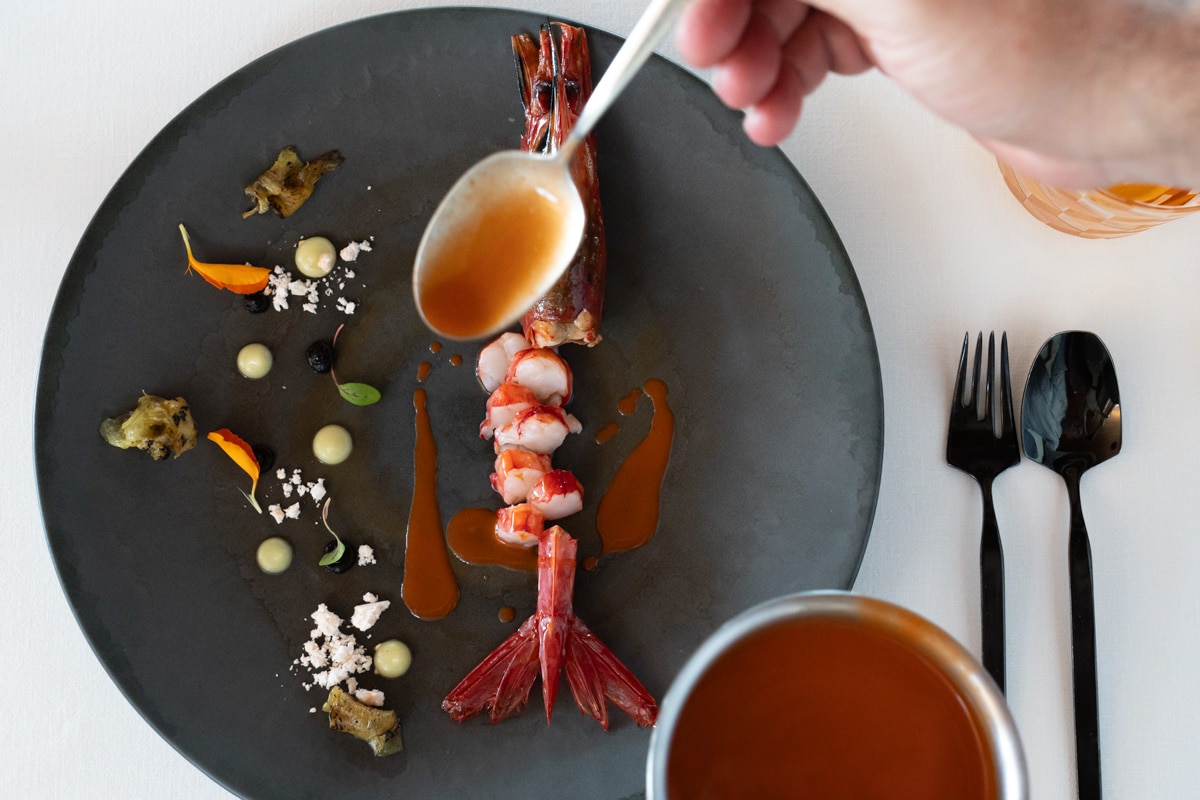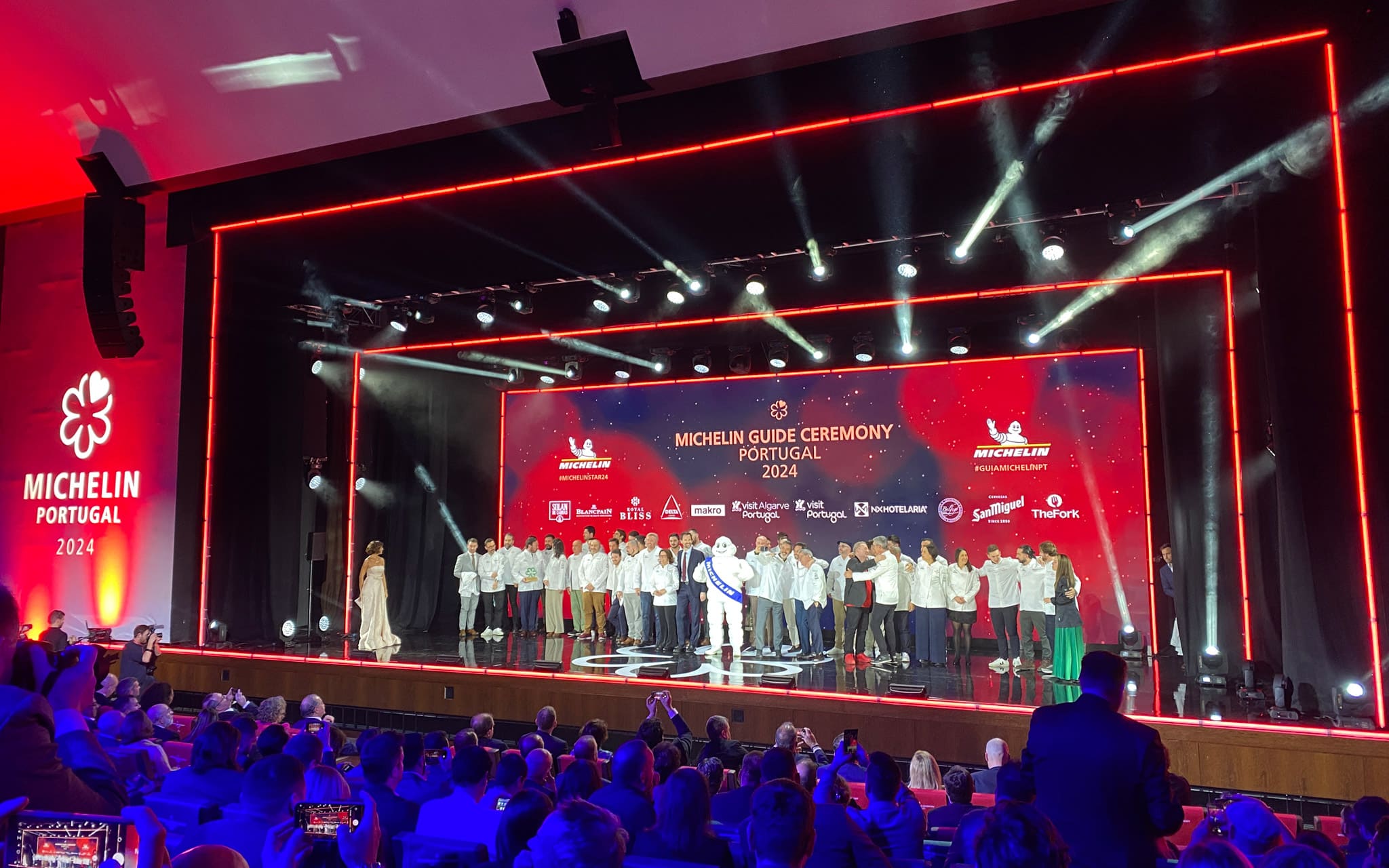I Attended Portugal’s First Dedicated MICHELIN Gala: Here’s Who Won and What Happens Behind the Scenes
This website uses affiliate links which may earn a commission at no additional cost to you. As an Amazon Associate I earn from qualifying purchases.
Updated: 28th February 2024
As someone who spent close to a decade managing restaurants, the chance to attend a MICHELIN Gala was always an out-of-reach hospitality career pinnacle. Yet, last night, somewhat unexpectedly, that dream came true as I walked up a red carpet to attend a MICHELIN award ceremony. And not just any awards either – this was the very first MICHELIN Gala dedicated entirely to Portugal, revealing Portugal’s MICHELIN restaurants for 2024 in a standalone event and not as a tag-on to Spain’s ceremony as in previous years.
Honestly, it was a huge privilege to attend, but I had no idea what to expect. I’ve been following Portugal’s culinary evolution over the previous few years – in particular since last year’s announcement of a dedicated MICHELIN Guide – and I was really excited to see one of Portugal’s restaurants receive its first third star (sad spoiler: none did). But beyond knowing that stars would be given and chefs would be in attendance, I wasn’t sure how the night would play out.
So, whether you’re nosy at what goes on behind the scenes (and at the after parties) of a MICHELIN Gala, want to know which restaurants made Portugal’s MICHELIN Guide for 2024, or just want to understand better how the MICHELIN star system works, I’ll try to fill in the blanks.

Attending Portugal’s first dedicated MICHELIN Gala Dinner
As someone who regularly writes about Portugal, I’d enquired about attending the Portugal MICHELIN Gala as part of the media a while back. However, I soon learnt that you couldn’t request a ticket to a MICHELIN Gala; it’s an invite-only event. And that also applies to Media, as you don’t only attend on the sidelines but can sit and enjoy the show and after-party. Very happily, I received an invite a few weeks before the Gala.
Arriving at the 5* Resort NAU Salgados Palace & Congress Center in the Algarve, which was hosting this year’s Portugal MICHELIN Gala, I felt a real sense of pride for the region I call home. Often, the south of Portugal is considered a beach destination rather than a gastronomic getaway, yet this really doesn’t do justice to everything that the Algarve has to offer. Walking down the red carpet and stepping into the entrance hall buzzing with excited chefs being interviewed by TV stations, it was evident how much tonight meant to chefs and restaurants around the country.
The award ceremony itself was hosted in the main auditorium, with around 500 people in attendance. It was also live-streamed and broadcast on Portuguese TV. Over the two hour ceremony, presented by the glamorous Catarina Furtado, the new MICHELIN awards for 2024 were handed out across the Recommended, Bib Gourmand, Green Star, One Star and Two Star Categories. There were also a few special category awards given. Gwendal Poullennec, the International Director of the MICHELIN Guides, also joined Furtado on stage for the main awards, and there were two performances by Fado singer Cuca Roseta. The best part of the ceremony for me was seeing the camaraderie between the chefs from all across the country and the genuine excitement everyone had for their fellow kitchen’s success.


The MICHELIN Gala Portugal After Party – and the food!
After the awards were given, everyone moved upstairs for the after-party. At each MICHELIN Gala, this will be different, however there’s certainly one thing that is expected – delicious food. And there, the evening did not disappoint.
To showcase Portugal as one of Europe’s best food destinations, there was a series of Show Cooking stands set up around the room, led by some of the Algarve’s MICHELIN-starred restaurants. I was really excited and happy to see this, as the spotlight was firmly on the south. There were a few chefs and restaurants there that I know, such as Chef José Lopes from Bon Bon Restaurant near where I live, and other dining rooms that I haven’t been to (read: can’t afford or secure a table), such as Two Starred Vila Joya. All of the stands served two of their signature dishes, which were mainly focused on regional flavours. Vista’s Choco á Algarvia, Ocean’s Feijoada de Polvo (Octopus stew), and A Ver Tavira’s use of Aljezur’s Sweet Potatoes (the town is so obsessed with them they have a potato festival) were some of the delicious dishes.
The rest of the night was just one big fat party, with a DJ, free-flowing drinks including Portuguese gin and an excellent array of Portuguese wines selected by renowned Robert Parker. And while there was no Three Star announcement, everyone was in great spirits, and this was perhaps the best part of the night. With everyone so glammed up, you can easily forget it’s essentially just a bunch of restaurant staff with a free bar and a lot of excitement – something anyone who has worked in hospitality will know means a cracking night out no matter if it’s a MICHELIN Gala or not. Seeing some of my favourite chefs such as Rui Paula and Vasco Coehlo Santos – two of the main reasons why Porto is a great foodie city break – and everyone else celebrating their dedicated MICHELIN Gala was a great feeling, and the party went on until the early hours.


Who were the MICHELIN Star winners for 2024?
All previous Two Star restaurants retained their star, and they were joined by Antiqvvm in Porto, headed up by Chef Vitor Matos, which received its second star.
Four new restaurants were awarded One Star. These were 2Monkeys Restaurant (again, by Vitor Matos), Desarma (Funchal), Ó Balcão (Santarém), and SÁLA by João Sá (Lisbon).
There were two new Green Stars (given for sustainability) awarded to Malhadinha Nova (Albernoa) and Ó Balcão (Santarém).
In the Bib Gourmand category, which celebrates excellent quality and price ratio, there were eight new restaurants listed. These were Flora (Viseu), Inato Bistrô (Braga), Norma (Guimarães), Olaias (Figueira da Foz), OMA (Baião), O Pastus (Paço de Arcos), Patio 44 (Porto) and PODA (Montemor-o-Novo).
Added to the Recommended category of Portugal’s MICHELIN Guide were a further 21 restaurants. Most exciting for me were Bomfim 1896 in the Douro Valley (this is a gorgeous restaurant by Pedro Lemos that I can’t recommend enough) and Restaurante Noélia in the Algarve, which beloved MasterChef Portugal judge Noélia Jerónimo leads. I spent a few months living in Cabanas de Tavira, where Noélia’s is located and was really impressed by the quality of the dishes and traditional recipes used.
The three special awards of the evening went to Rita Magro (Blind) as Young Chef of the Year, Pedro Marques (The Yeatman – one of Porto’s best restaurants) for Service, and Leonel Nunes (Il Gallo d’Oro) won the Sommelier Award.
I think it’s fair to say that the nuance of the different awards, especially on the red plaques outside restaurants, can be easily misinterpreted. But remember, if you do see one of the red MICHELIN signs outside a restaurant, it will quantify either the number of stars, if it’s recommended, or if it’s a Bib Gourmand (the MICHELIN man’s face with a tongue out).
To see the full list of all restaurants, including those who retained their ranking from 2023, review the new MICHELIN Portugal Guide online.

How does the MICHELIN Star system work? Can you lose your star?
There’s a well-written guide to how the MICHELIN Star system works on their website, but yes, you absolutely can lose a MICHELIN Star. More than one inspector visits restaurants, and then rankings are agreed on, so a poor experience can drag down the ranking.
Three restaurants in Portugal did lose their MICHELIN Star this year. One was due to closing, another was due to being closed for renovations (thus, can’t be inspected), and a third lost its star after the chef left. It’s important to stress, however, that if a Chef leaves the restaurant, it doesn’t automatically lose its star, as the MICHELIN designation is given to the kitchen overall, NOT the individual Chef. However, if the quality doesn’t remain at the same standard once the Chef leaves, then the star is lost for that reason. The Stars are given solely for the quality of the food, so anything else doesn’t officially matter.
As MICHELIN says in their own words: “The stars, meanwhile, are indicators of the quality of a restaurant’s food alone, which are assessed according to five publicly acknowledged criteria: the quality of ingredients used, the skill in food preparation, the combination of flavours, the value for money, the consistency of culinary standards”.

Who pays for the MICHELIN Guide? Is it independent? Who decides which restaurants to visit?
In the instance of Portugal, it was reported by a national newspaper that the cost of hosting this year’s MICHELIN Gala and Guide was around €400,000. This money comes from Visit Portugal, the national tourism board, plus additional private companies sponsoring the event.
But is this impartial? Well, it’s complicated. In the sense of global coverage, the answer is no. The Caribbean and Africa, for example, don’t have any MICHELIN Guides or Starred restaurants, as the company simply does not operate there. So, this obviously can give the countries with the funds to pay for a MICHELIN Guide a leg up while also contributing to most “Best Chef” lists being dominated by White chefs. But, from a purely business sense, it figures. Someone has to pay for the inspectors to eat in many (expensive) restaurants numerous times, and the business model wouldn’t work if it were all funded by tyres—yes, they are one and the same MICHELIN.
However, at a local restaurant by restaurant recommendation for readers level, this does keep it impartial. This is because the funds to assess the restaurants come from one single pot at a national level, and then it’s up to the MICHELIN inspectors to decide where they visit and the rankings they make. However, of course, they can’t visit every restaurant in a country, so how is it decided?
Well, restaurants cannot pay or ask to be listed in the Guide. But they can ask to be considered, contacting the Michelin HQ to put themselves on the radar for a potential visit. Other times, inspectors may happen to stumble upon a place, have received recommendations from readers, or have decided to check out a place with some buzz about it already. It seems restaurants need to be a little proactive to get their first inspection, and then after that, if deemed of high enough quality, they will be assessed again before potential inclusion in the Guide.

Does MICHELIN always get it right?
I think it’s a fair question to ask, especially as with the huge investment of extra cash and the spotlight of a dedicated ceremony, most people were likely expecting Portugal to get at least one Three Star designation. Sadly, it wasn’t meant to be this year, but if anything, that perhaps proves that MICHELIN can’t be bought, and just because a lot more money is injected into the Guide, successes are not guaranteed. Still, some will be left wondering if it’s really true that there isn’t even one restaurant in Portugal that deserves the accolade. Three Stars means “with exceptional cooking worth a special trip for” – something that will hopefully be addressed in 2025.
Another curiosity is that the Azores are still yet to receive any recognition, and it’s unclear if, due to the nine-island nature of the archipelago, they have been overlooked (while Madeira is featured) or if no kitchen there has impressed the inspectors enough yet. Either way, one thing is for sure: Portugal wants the world to talk about its gastronomy, and not just port, pastel de nata and bacalhau!





Leave a Reply
Want to join the discussion?Feel free to contribute!